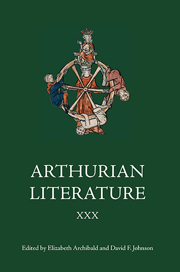Book contents
- Frontmatter
- Contents
- General Editors' Foreword
- List of Contributors
- I Magic and the Supernatural in Early Welsh Arthurian Narrative: Culhwch ac Olwen and Breuddwyd Rhonabwy
- II How Green was the Green Knight? Forest Ecology at Hautdesert
- III Edward III's Arthurian Enthusiasms Revisited: Perceforest in the Context of Philippa of Hainault and the Round Table Feast of 1344
- IV Pagan Gods and the Coming of Christianity in Perceforest
- V Malory's Sources for the Tale of the Sankgreal: Some Overlooked Evidence from the Irish Lorgaireacht an tSoidigh Naomhtha
- VI ‘Transmuer de rime en prose’: The Transformation of Chrétien de Troyes's Joie de la Cour episode in the Burgundian Prose Erec (1450–60)
- VII La Rétro-écriture ou l'écriture de la nostalgie dans le roman arthurien tardif: Ysaïe le Triste, Le Conte du Papegau et Mélyador de Froissart
- VIII Remembering Brutus: Aaron Thompson's British History of 1718
- Contents of Previous Volumes
VII - La Rétro-écriture ou l'écriture de la nostalgie dans le roman arthurien tardif: Ysaïe le Triste, Le Conte du Papegau et Mélyador de Froissart
Published online by Cambridge University Press: 05 March 2014
- Frontmatter
- Contents
- General Editors' Foreword
- List of Contributors
- I Magic and the Supernatural in Early Welsh Arthurian Narrative: Culhwch ac Olwen and Breuddwyd Rhonabwy
- II How Green was the Green Knight? Forest Ecology at Hautdesert
- III Edward III's Arthurian Enthusiasms Revisited: Perceforest in the Context of Philippa of Hainault and the Round Table Feast of 1344
- IV Pagan Gods and the Coming of Christianity in Perceforest
- V Malory's Sources for the Tale of the Sankgreal: Some Overlooked Evidence from the Irish Lorgaireacht an tSoidigh Naomhtha
- VI ‘Transmuer de rime en prose’: The Transformation of Chrétien de Troyes's Joie de la Cour episode in the Burgundian Prose Erec (1450–60)
- VII La Rétro-écriture ou l'écriture de la nostalgie dans le roman arthurien tardif: Ysaïe le Triste, Le Conte du Papegau et Mélyador de Froissart
- VIII Remembering Brutus: Aaron Thompson's British History of 1718
- Contents of Previous Volumes
Summary
This essay seeks to analyse the modalities and implications of a style of writing which I call ‘rétro-écriture’; a style that evokes a nostalgia for heritage and the past, and whose name is drawn from recent studies in the field of retro-marketing. I examine the means by which this pact with the past responds to the nostalgic desires of a community of readers at the end of the Middle Ages in three late medieval Arthurian Romances – namely, through an experience of ancient literary material comparable to museum-visiting, and the paradoxical and playful co-presence of the ancient and the modern.
On observe aujourd'hui une forte tendance à valoriser les romans tardifs de la fin du quatorzième siècle-milieu quinzième siècle, à deux titres: comme les témoins d'une nostalgie du temps passé, réactivant la devise ‘d'armes et d'amour’, certes, mais aussi comme les précurseurs d'une forme de modernité. Après avoir considéré ces textes tardifs comme décadents, mal construits, la critique les pare désormais de nombre d'atouts, en partie avec raison, en partie parce que nous nous trouvons dans la situation des écrivains de la fin du Moyen Âge, où il faut faire avec ce qui reste, de façon toute pragmatique.
Le Moyen Âge finissant est un grand laboratoire qui expérimente de nouvelles formes à partir des reliques (modèles sanctifiés) et des restes (fragments dépecés) de la littérature antérieure. Démembrement, recyclage, nouvel assemblage sont autant de modalités du processus de récupération et de remploi que nous tenterons d'examiner ici.
- Type
- Chapter
- Information
- Arthurian Literature XXX , pp. 117 - 140Publisher: Boydell & BrewerPrint publication year: 2013



